#Changemanagement
Scott M. Graffius Named a Top Thought Leader and Influencer in Four Domains: Agile, Digital Transformation, Change Management, and GovTech
10 May 2021
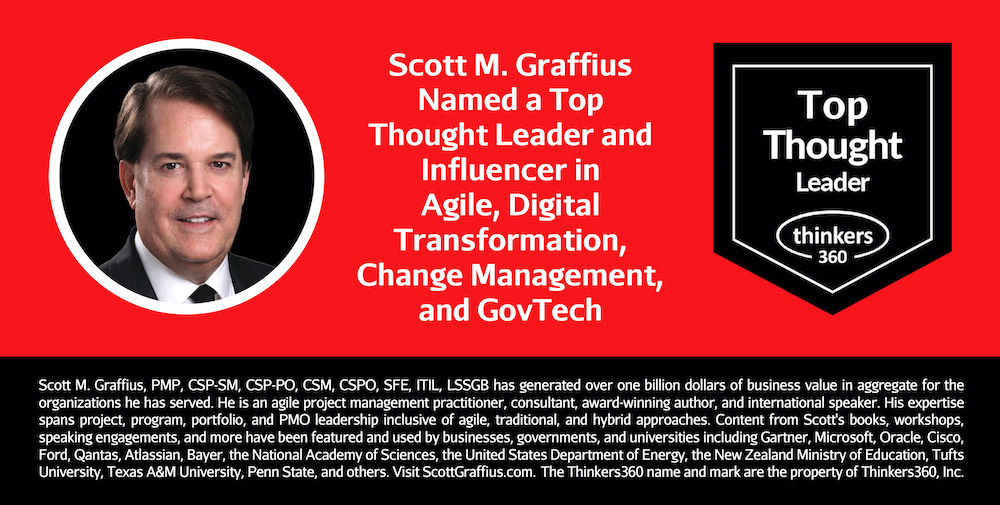
Content from Scott M. Graffius's award-winning books on agile project management, workshops, speaking engagements, and more have been featured and used by businesses, governments, and universities including Gartner, Microsoft, Oracle, Cisco, Ford, Qantas, Atlassian, Bayer, the National Academy of Sciences, the United States Department of Energy, the United States Army, the New Zealand Ministry of Education, Tufts University, Texas A&M University, Warsaw University of Technology, University of Waterloo, National University of Ireland Galway, Loughborough University London, and others.
Thinkers360 previously named Scott a global thought leader and influencer in three domains: Agile, Digital Transformation, and GovTech. Today, Thinkers360 added Scott to another list—the one on Change Management thought leaders and influencers. Announcements are here, here, and here.
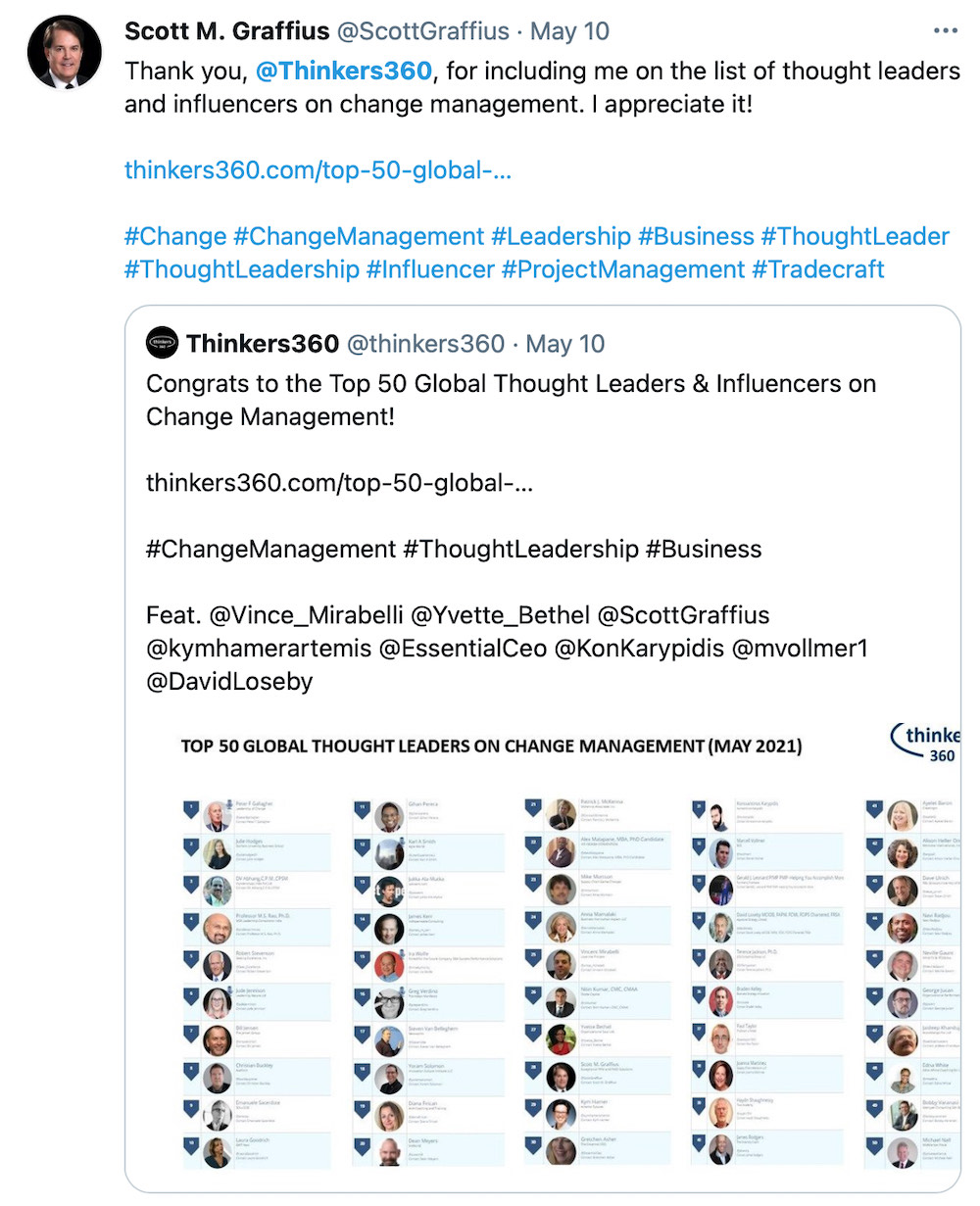
Thinkers360 is the world’s first open platform for thought leaders and influencers. Their patent-pending approach to rating thought leaders and influencers factors each candidate’s diverse contributions and content such as articles, books, media coverage, podcasts, social media, speaking events, videos, and more.

About Scott M. Graffius

Scott M. Graffius has generated hundreds of millions of dollars of business value in aggregate for the organizations he has served. He is an agile project management practitioner, consultant, award-winning author, and international speaker. His expertise spans project, program, portfolio, and PMO leadership inclusive of agile, traditional, and hybrid approaches. Content from Scott's books, workshops, speaking engagements, and more have been featured and used by businesses, governments, and universities including Gartner, Microsoft, Oracle, Cisco, Ford, Qantas, Atlassian, Bayer, the National Academy of Sciences, the United States Department of Energy, the United States Army, the New Zealand Ministry of Education, Tufts University, Texas A&M University, Virginia Tech, Penn State, Warsaw University of Technology, University of Waterloo, National University of Ireland Galway (NUI Galway), Loughborough University London, and others. Thinkers360 named Scott a global top thought leader and influencer in four domains: Agile, Change Management, Digital Transformation, and GovTech.
Scott is the CEO of Exceptional PPM and PMO Solutions™, a professional services firm, where he helps client organizations strengthen their project management capabilities and realize their strategic objectives and business initiatives. The consultancy provides advisory, training, and facilitative consulting services related to governance and project, program, portfolio, and PMO management. The firm’s expertise spans agile, traditional waterfall, and hybrid approaches. While every engagement is unique, outcomes typically include getting more projects done, faster delivery time, improved on-budget performance, improved customer and stakeholder satisfaction, and more. Exceptional PPM and PMO Solutions™ confidently backs its services with a Delighted Client Guarantee™.
A fantastic agile transformation experience and result with a client organization in the entertainment industry was the inspiration for Scott’s first book, Agile Scrum: Your Quick Start Guide with Step-by-Step Instructions (ISBN-13: 9781533370242). It helps technical and non-technical teams develop and deliver products in short cycles with rapid adaptation to change, fast time-to-market, and continuous improvement—which supports innovation and drives competitive advantage. The book garnered 17 first place awards from national and international competitions. His second title, Agile Transformation: A Brief Story of How an Entertainment Company Developed New Capabilities and Unlocked Business Agility to Thrive in an Era of Rapid Change (ISBN-13: 9781072447962), was named one of the best Scrum books of all time by BookAuthority. Scott and his works have been featured by media outlets and publications including Yahoo Finance, Computer Weekly, the Boston Herald, MobileAppDaily, NBC WRAL, Thinkers360, Informa (UAE), the Dallas Business Journal, Innovation Management (Sweden), the PM World Journal, ip-label (United Kingdom), BookLife by Publisher’s Weekly, NASSCOM (India), Software Quality Management, Nimble Ways (Morocco), The Hiring Analytics Playbook, ALLAGIS (Guatemala), Business Application Monitoring, Human-Station (France), Learning Solutions, The Marketing Factory (Netherlands), Innovation Ecosystem Metrics, DZone, Savills (India), BRP Creative (Australia), People Performance (Singapore), Innovation Project Management by Dr. Harold Kerzner, TopDevs (Canada), Shelf Unbound, Epicos (Greece), Luxembourg Trade and Invest (Luxembourg), Better Humans, Serendipity (Netherlands), NHD Podcast, and others.
Scott is a former vice president of project management with a publicly traded provider of diverse consumer products and services over the Internet. Before that, he ran and supervised the delivery of projects and programs in public and private organizations with businesses ranging from e-commerce to advanced technology products and services, retail, manufacturing, entertainment, and more. He has experience with consumer, business, reseller, government, and international markets, as well as experience spanning 20 countries.
Scott has a bachelor's degree in Psychology with a focus in Human Factors. He holds eight professional certifications: Certified Scrum Professional - ScrumMaster (CSP-SM), Certified Scrum Professional - Product Owner (CSP-PO), Certified ScrumMaster (CSM), Certified Scrum Product Owner (CSPO), Scrum Foundations Educator (SFE), Project Management Professional (PMP), Lean Six Sigma Green Belt (LSSGB), and IT Service Management Foundation (ITIL). He is a member of the Scrum Alliance, the Project Management Institute, and the Institute of Electrical and Electronics Engineers.
He has been actively involved with the Project Management Institute (PMI) in the development of professional standards. He was a member of the team which produced the Practice Standard for Work Breakdown Structures—Second Edition. Scott was a contributor and reviewer of A Guide to the Project Management Body of Knowledge—Sixth Edition, The Standard for Program Management—Fourth Edition, and The Practice Standard for Project Estimating—Second Edition. He was also a subject matter expert reviewer of content for the PMI EMEA Congress 2019, and he served as a member of the review team for the Scrum Alliance’s Global Scrum Gathering—New York City 2020.
Scott delivers dynamic and engaging talks at in-person and online events around the world. His speaking engagements include in-person and online conferences and other events in Australia, Canada, Czech Republic, Finland, France, Germany, Greece, India, Ireland, Lithuania, Luxembourg, Netherlands, New Zealand, United Kingdom, and the United States. Scott delights audiences with sessions on technology leadership and project, program, portfolio, and PMO management inclusive of agile, waterfall, and hybrid approaches. He uses everyday language and vibrant custom visuals to make complex topics clear, and he provides audiences with practical information they can use. For details, visit the public speaker section of his website.
His full bio is available here.
Connect with Scott on:
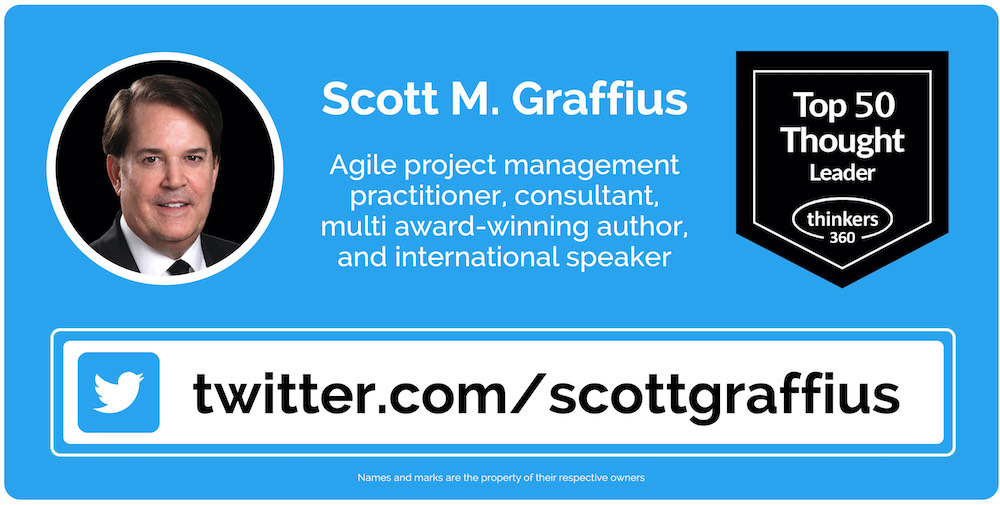

© Copyright 2021 Scott M. Graffius. All rights reserved. This material may not be published, broadcast, rewritten or redistributed without the express written permission of Scott M. Graffius.

AGILE TRANSFORMATION Snags Additional Awards from BookAuthority; Trailer Updated
17 October 2019
Follow @scottgraffius
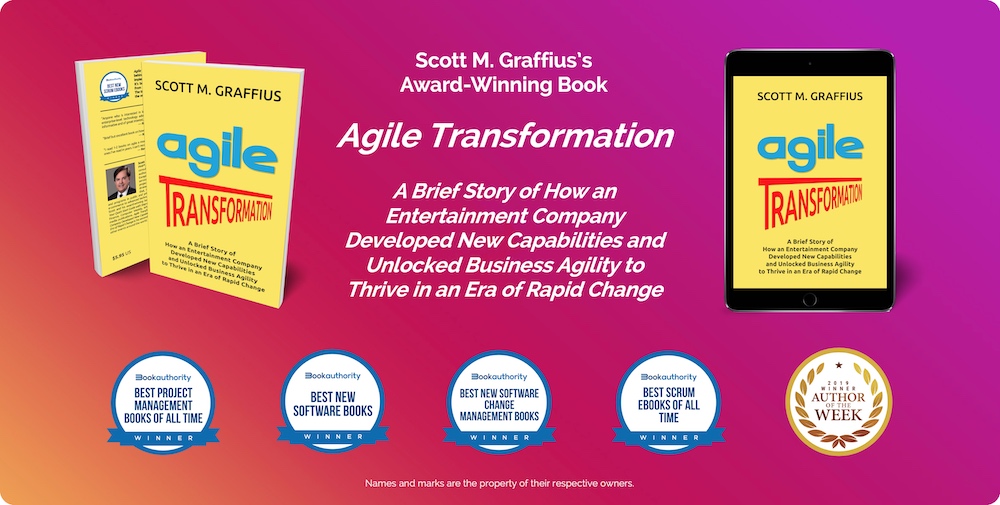
Soon after Agile Transformation: A Brief Story of How an Entertainment Company Developed New Capabilities and Unlocked Business Agility to Thrive in an Era of Rapid Change was released earlier this year, BookAuthority named the ebook/Kindle format of the publication a winner in multiple categories, including Best Scrum Ebooks of All Time. Agile Transformation is also available in print, and BookAuthority recently honored the paperback as a winner in multiple categories, including Best Project Management Books of All Time. Thank you to BookAuthority for the recognition! The short (30-second) trailer for the book was updated to highlight the two awards listed above. Details and the refreshed trailer are available here: https://www.facebook.com/AgileTransformationBook/videos/450537145587506/. You’re invited to check them out.


About Author Scott M. Graffius

Scott M. Graffius, CSP-SM, CSP-PO, CSM, CSPO, PMP, ITIL, LSSGB is a project management expert, consultant, speaker, and author. He is a Principal Consultant and the CEO of Exceptional PPM and PMO Solutions™, a professional services firm, where he helps clients strengthen their project management capabilities and realize their strategic objectives and business initiatives. Before that, he ran and supervised the delivery of projects and programs in public and private companies with businesses ranging from e-commerce to advanced technology, manufacturing, entertainment, and more. Scott and his award-winning book on agile project management, Agile Scrum: Your Quick Start Guide with Step-by-Step Instructions, have been featured in Yahoo Finance, the Boston Herald, Learning Solutions, Informa, Innovation Management, and additional media publications. His second title, Agile Transformation: A Brief Story of How an Entertainment Company Developed New Capabilities and Unlocked Business Agility to Thrive in an Era of Rapid Change, was published in April 2019. BookAuthority named it one of the best new books on Scrum. Scott regularly speaks at conferences and other events around the world.
His full bio is available here.
Connect with Scott on:


About Agile Scrum: Your Quick Start Guide with Step-by-Step Instructions
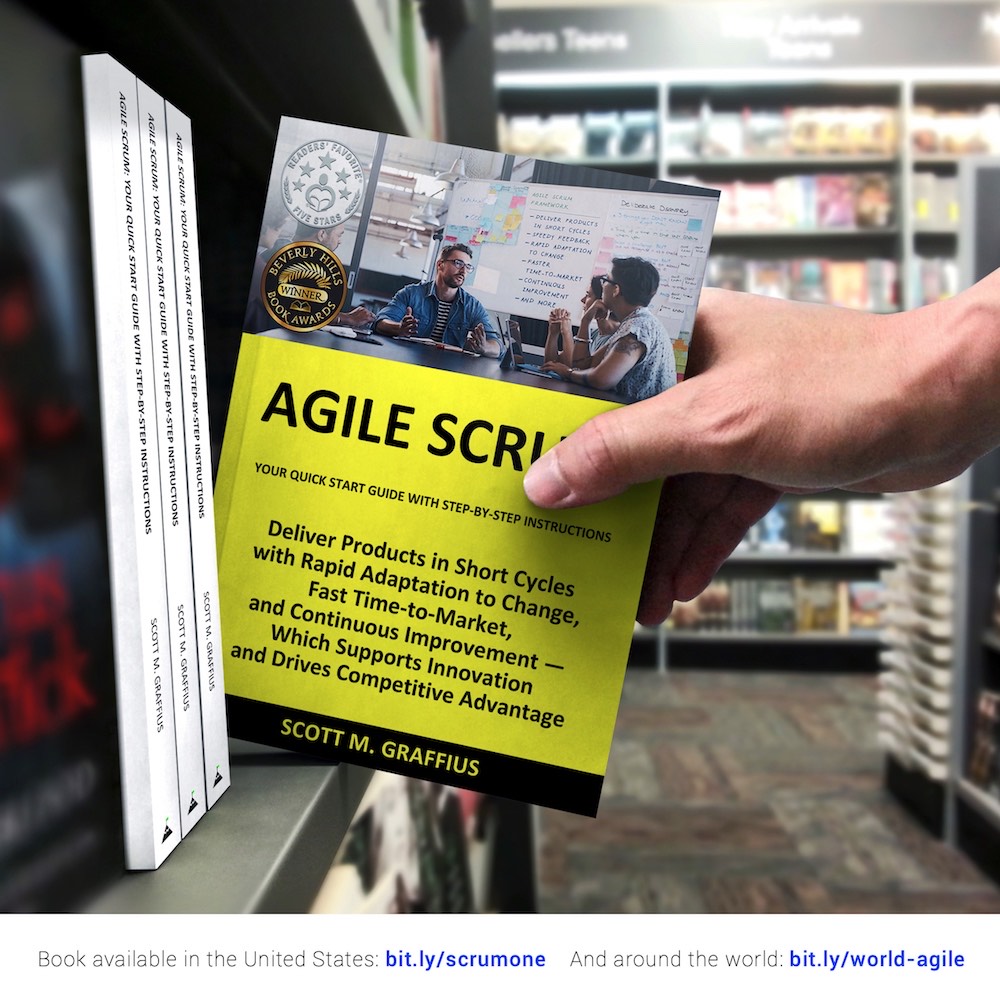
Shifting customer needs are common in today's marketplace. Businesses must be adaptive and responsive to change while delivering an exceptional customer experience to be competitive.
There are a variety of frameworks supporting the development of products and services, and most approaches fall into one of two broad categories: traditional or agile. Traditional practices such as waterfall engage sequential development, while agile involves iterative and incremental deliverables. Organizations are increasingly embracing agile to manage projects, and best meet their business needs of rapid response to change, fast delivery speed, and more.
With clear and easy to follow step-by-step instructions, Scott M. Graffius's award-winning Agile Scrum: Your Quick Start Guide with Step-by-Step Instructions helps the reader:
Hailed by Literary Titan as “the book highlights the versatility of Scrum beautifully.”
Winner of 17 first place awards.
Agile Scrum: Your Quick Start Guide with Step-by-Step Instructions is available in paperback and ebook/Kindle in the United States and around the world. Some links by country follow.

About Agile Transformation: A Brief Story of How an Entertainment Company Developed New Capabilities and Unlocked Business Agility to Thrive in an Era of Rapid Change
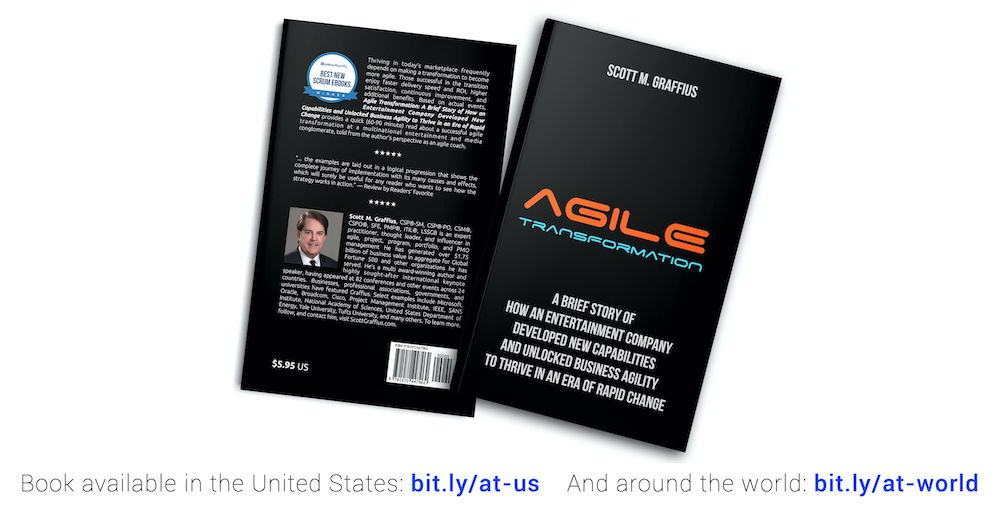
Thriving in today's marketplace frequently depends on making a transformation to become more agile. Those successful in the transition enjoy faster delivery speed and ROI, higher satisfaction, continuous improvement, and additional benefits.
Based on actual events, Agile Transformation: A Brief Story of How an Entertainment Company Developed New Capabilities and Unlocked Business Agility to Thrive in an Era of Rapid Change provides a quick (60-90 minute) read about a successful agile transformation at a multinational entertainment and media company, told from the author's perspective as an agile coach.
The award-winning book by Scott M. Graffius is available in paperback and ebook/Kindle in the United States and around the world. Some links by country follow.

About BookAuthority
BookAuthority curates the books recommended by the world's most successful CEOs, business leaders, and domain experts such as Elon Musk, Warren Buffett, Sheryl Sandberg, and David Allen. Only the very best books are featured on BookAuthority. To keep BookAuthority's site objective and unbiased, ratings are calculated purely based on data. BookAuthority uses a proprietary technology to identify and rate the best nonfiction books, using dozens of different signals, including public mentions, recommendations, ratings, sentiment, popularity and sales history. BookAuthority does not accept requests to feature books, nor does BookAuthority conduct business with publishers or authors. BookAuthority has been featured on CNN, Forbes and Inc. The preceding information is based on content from BookAuthority.org.

© Copyright 2019 Scott M. Graffius. All rights reserved. This material may not be published, broadcast, rewritten or redistributed without the express written permission of Scott M. Graffius.


Soon after Agile Transformation: A Brief Story of How an Entertainment Company Developed New Capabilities and Unlocked Business Agility to Thrive in an Era of Rapid Change was released earlier this year, BookAuthority named the ebook/Kindle format of the publication a winner in multiple categories, including Best Scrum Ebooks of All Time. Agile Transformation is also available in print, and BookAuthority recently honored the paperback as a winner in multiple categories, including Best Project Management Books of All Time. Thank you to BookAuthority for the recognition! The short (30-second) trailer for the book was updated to highlight the two awards listed above. Details and the refreshed trailer are available here: https://www.facebook.com/AgileTransformationBook/videos/450537145587506/. You’re invited to check them out.

About Author Scott M. Graffius

Scott M. Graffius, CSP-SM, CSP-PO, CSM, CSPO, PMP, ITIL, LSSGB is a project management expert, consultant, speaker, and author. He is a Principal Consultant and the CEO of Exceptional PPM and PMO Solutions™, a professional services firm, where he helps clients strengthen their project management capabilities and realize their strategic objectives and business initiatives. Before that, he ran and supervised the delivery of projects and programs in public and private companies with businesses ranging from e-commerce to advanced technology, manufacturing, entertainment, and more. Scott and his award-winning book on agile project management, Agile Scrum: Your Quick Start Guide with Step-by-Step Instructions, have been featured in Yahoo Finance, the Boston Herald, Learning Solutions, Informa, Innovation Management, and additional media publications. His second title, Agile Transformation: A Brief Story of How an Entertainment Company Developed New Capabilities and Unlocked Business Agility to Thrive in an Era of Rapid Change, was published in April 2019. BookAuthority named it one of the best new books on Scrum. Scott regularly speaks at conferences and other events around the world.
His full bio is available here.
Connect with Scott on:


About Agile Scrum: Your Quick Start Guide with Step-by-Step Instructions

Shifting customer needs are common in today's marketplace. Businesses must be adaptive and responsive to change while delivering an exceptional customer experience to be competitive.
There are a variety of frameworks supporting the development of products and services, and most approaches fall into one of two broad categories: traditional or agile. Traditional practices such as waterfall engage sequential development, while agile involves iterative and incremental deliverables. Organizations are increasingly embracing agile to manage projects, and best meet their business needs of rapid response to change, fast delivery speed, and more.
With clear and easy to follow step-by-step instructions, Scott M. Graffius's award-winning Agile Scrum: Your Quick Start Guide with Step-by-Step Instructions helps the reader:
- Implement and use the most popular agile framework―Scrum;
- Deliver products in short cycles with rapid adaptation to change, fast time-to-market, and continuous improvement; and
- Support innovation and drive competitive advantage.
Hailed by Literary Titan as “the book highlights the versatility of Scrum beautifully.”
Winner of 17 first place awards.
Agile Scrum: Your Quick Start Guide with Step-by-Step Instructions is available in paperback and ebook/Kindle in the United States and around the world. Some links by country follow.
- 🇧🇷 Brazil
- 🇨🇦 Canada
- 🇨🇿 Czech Republic
- 🇩🇰 Denmark
- 🇫🇮 Finland
- 🇫🇷 France
- 🇩🇪 Germany
- 🇬🇷 Greece
- 🇭🇺 Hungary
- 🇮🇳 India
- 🇮🇪 Ireland
- 🇮🇱 Israel
- 🇮🇹 Italy
- 🇯🇵 Japan
- 🇱🇺 Luxembourg
- 🇲🇽 Mexico
- 🇳🇱 Netherlands
- 🇳🇿 New Zealand
- 🇳🇴 Norway
- 🇪🇸 Spain
- 🇸🇪 Sweden
- 🇨🇭 Switzerland
- 🇦🇪 UAE
- 🇬🇧 United Kingdom
- 🇺🇸 United States

About Agile Transformation: A Brief Story of How an Entertainment Company Developed New Capabilities and Unlocked Business Agility to Thrive in an Era of Rapid Change

Thriving in today's marketplace frequently depends on making a transformation to become more agile. Those successful in the transition enjoy faster delivery speed and ROI, higher satisfaction, continuous improvement, and additional benefits.
Based on actual events, Agile Transformation: A Brief Story of How an Entertainment Company Developed New Capabilities and Unlocked Business Agility to Thrive in an Era of Rapid Change provides a quick (60-90 minute) read about a successful agile transformation at a multinational entertainment and media company, told from the author's perspective as an agile coach.
The award-winning book by Scott M. Graffius is available in paperback and ebook/Kindle in the United States and around the world. Some links by country follow.
- 🇦🇺 Australia
- 🇦🇹 Austria
- 🇧🇷 Brazil
- 🇨🇦 Canada
- 🇨🇿 Czech Republic
- 🇩🇰 Denmark
- 🇫🇮 Finland
- 🇫🇷 France
- 🇩🇪 Germany
- 🇬🇷 Greece
- 🇮🇳 India
- 🇮🇪 Ireland
- 🇯🇵 Japan
- 🇱🇺 Luxembourg
- 🇲🇽 Mexico
- 🇳🇱 Netherlands
- 🇳🇿 New Zealand
- 🇪🇸 Spain
- 🇸🇪 Sweden
- 🇨🇭 Switzerland
- 🇦🇪 United Arab Emirates
- 🇬🇧 United Kingdom
- 🇺🇸 United States

About BookAuthority
BookAuthority curates the books recommended by the world's most successful CEOs, business leaders, and domain experts such as Elon Musk, Warren Buffett, Sheryl Sandberg, and David Allen. Only the very best books are featured on BookAuthority. To keep BookAuthority's site objective and unbiased, ratings are calculated purely based on data. BookAuthority uses a proprietary technology to identify and rate the best nonfiction books, using dozens of different signals, including public mentions, recommendations, ratings, sentiment, popularity and sales history. BookAuthority does not accept requests to feature books, nor does BookAuthority conduct business with publishers or authors. BookAuthority has been featured on CNN, Forbes and Inc. The preceding information is based on content from BookAuthority.org.

© Copyright 2019 Scott M. Graffius. All rights reserved. This material may not be published, broadcast, rewritten or redistributed without the express written permission of Scott M. Graffius.

Scott M. Graffius Delivering a Talk at DevOps Experience 2021 Conference
05 October 2021
Follow @scottgraffius
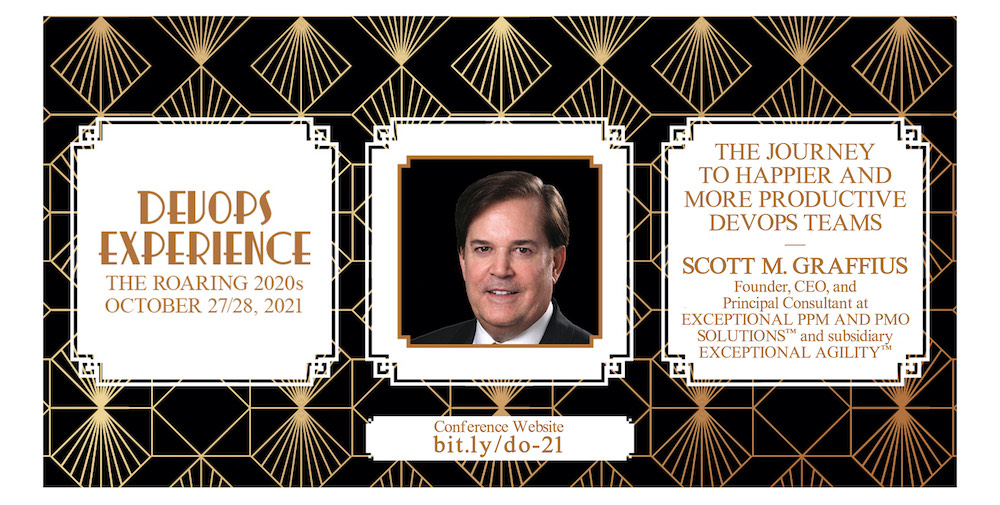
🔥 Update: The DevOps Experience 2021 conference recorded sessions and made the videos available. The video for Scott's session is included at the end of this post.
Scott M. Graffius will be speaking at the DevOps Experience 2021 Conference. Now in its 4th year, the conference will explore the role DevOps will play in the "roaring 2020s". This year, speakers and attendees will interact virtually. Scott will present “The Journey to Happier and More Productive DevOps Teams.” His session will air at:
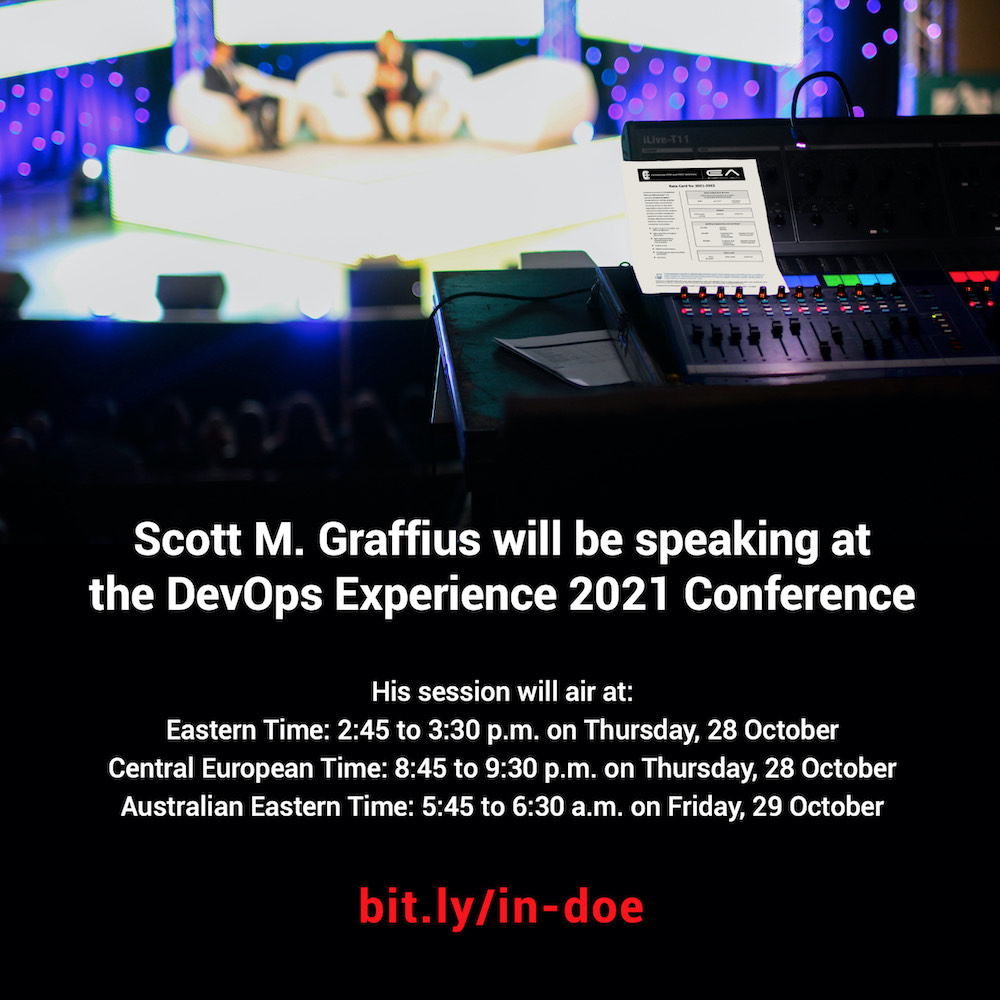
Attendees may be eligible to receivntinuing education unit (CEU) credit, equivalent to 0.75 Professional Development Hour (PDH). For reporting with the Project Management Institute (PMI), it's 0.75 Professional Development Unit (PDU), under the Leadership category. For reporting with the Scrum Alliance, it's 0.75 Scrum Educational Unit (SEU), under either the Learning category or the Events category. For reporting with other organizations, refer to their respective instructions.
To learn more and to secure tickets for the conference, visit https://www.techstrongevents.com/devopsexperience.


About Scott M. Graffius

Scott M. Graffius, PMP, CSP-SM, CSP-PO, CSM, CSPO, SFE, ITIL, LSSGB is an agile project management practitioner, consultant, award-winning author, and international speaker. He has generated over one billion dollars of business value in aggregate for the organizations he has served. Graffius is the founder, CEO, and principal consultant at Exceptional PPM and PMO Solutions™ and subsidiary Exceptional Agility™, based in Los Angeles, California. His expertise spans project, program, portfolio, and PMO leadership inclusive of agile, traditional, and hybrid approaches. Content from his books (Agile Scrum and Agile Transformation), workshops, speaking engagements, and more have been featured and used by businesses, governments, and universities including Gartner, Microsoft, Deloitte, Oracle, Cisco, Ford, Qantas, Atlassian, Bayer, the National Academy of Sciences, the United States Department of Energy, the United States Army, Project Management Institute, the IEEE, the New Zealand Ministry of Education, Tufts University, Texas A&M University, Virginia Tech, Penn State, Warsaw University of Technology, University of Waterloo, Loughborough University London, and others. Graffius has spoken at 58 conferences and other events around the world, including Armenia, Australia, Brazil, Canada, Czech Republic, Finland, France, Germany, Greece, India, Ireland, Lithuania, Luxembourg, Netherlands, New Zealand, Sweden, United Kingdom, and the United States. Thinkers360 named Graffius a global top thought leader and influencer in four domains: Agile, Change Management, Digital Transformation, and GovTech.
His full bio is available here.
Connect with Scott on:


About Agile Scrum: Your Quick Start Guide with Step-by-Step Instructions
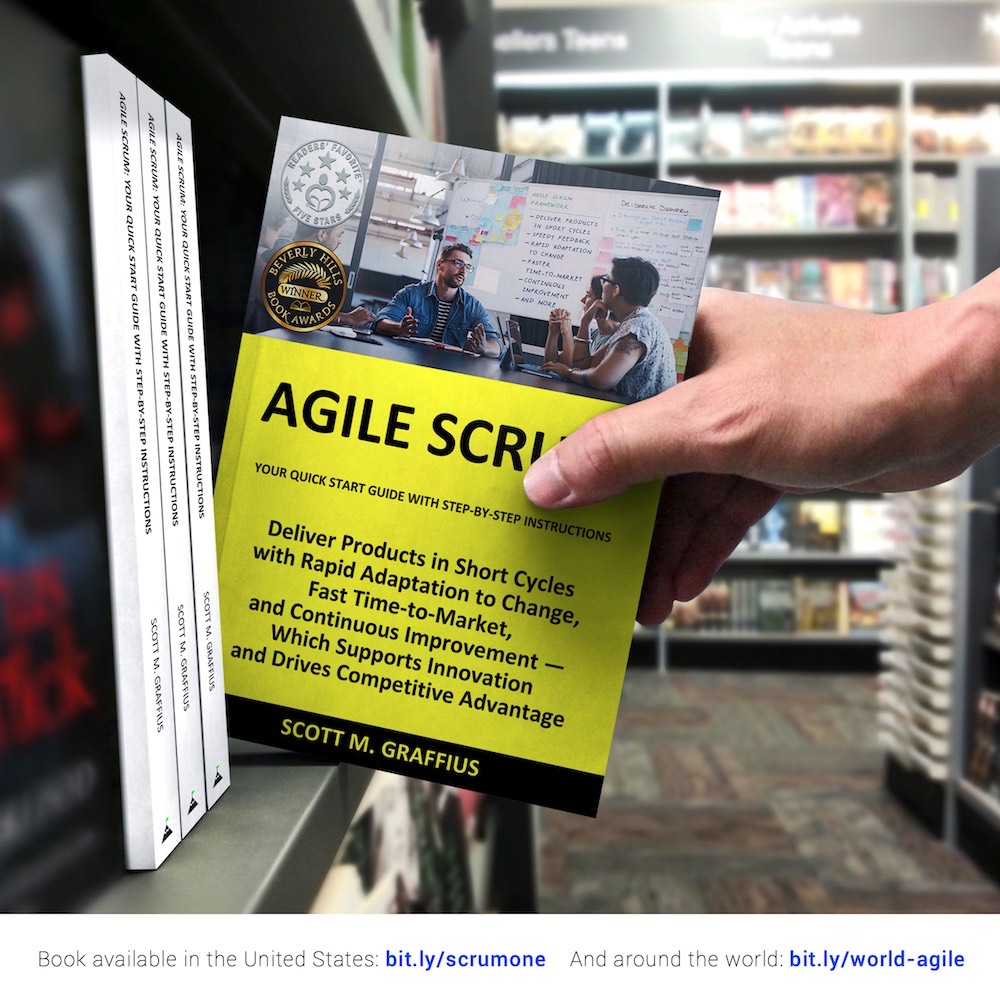
Shifting customer needs are common in today's marketplace. Businesses must be adaptive and responsive to change while delivering an exceptional customer experience to be competitive.
There are a variety of frameworks supporting the development of products and services, and most approaches fall into one of two broad categories: traditional or agile. Traditional practices such as waterfall engage sequential development, while agile involves iterative and incremental deliverables. Organizations are increasingly embracing agile to manage projects, and best meet their business needs of rapid response to change, fast delivery speed, and more.
With clear and easy to follow step-by-step instructions, Scott M. Graffius's award-winning Agile Scrum: Your Quick Start Guide with Step-by-Step Instructions helps the reader:
Hailed by Literary Titan as “the book highlights the versatility of Scrum beautifully.”
Winner of 17 first place awards.
Agile Scrum: Your Quick Start Guide with Step-by-Step Instructions is available in paperback and ebook/Kindle in the United States and around the world. Some links by country follow.

About Agile Transformation: A Brief Story of How an Entertainment Company Developed New Capabilities and Unlocked Business Agility to Thrive in an Era of Rapid Change
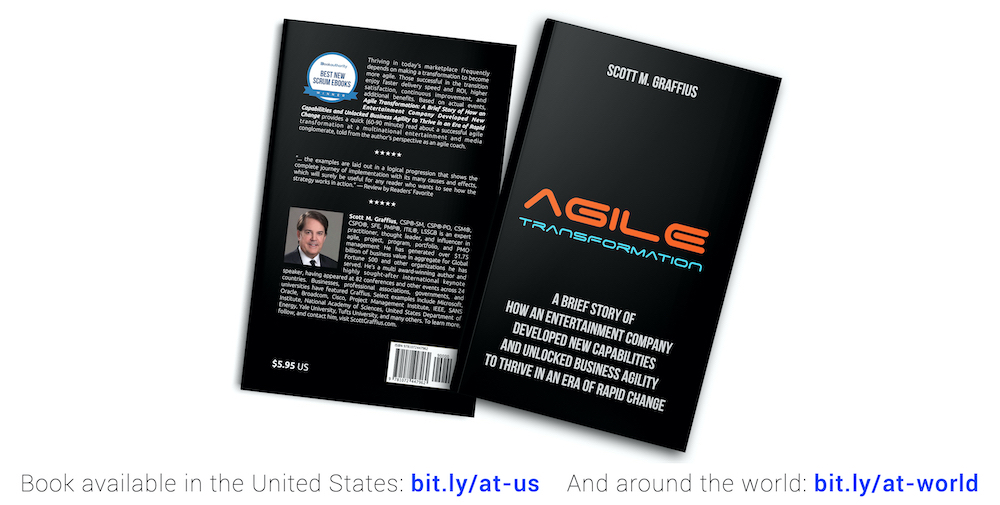
Thriving in today's marketplace frequently depends on making a transformation to become more agile. Those successful in the transition enjoy faster delivery speed and ROI, higher satisfaction, continuous improvement, and additional benefits.
Based on actual events, Agile Transformation: A Brief Story of How an Entertainment Company Developed New Capabilities and Unlocked Business Agility to Thrive in an Era of Rapid Change provides a quick (60-90 minute) read about a successful agile transformation at a multinational entertainment and media company, told from the author's perspective as an agile coach.
The award-winning book by Scott M. Graffius is available in paperback and ebook/Kindle in the United States and around the world. Some links by country follow.

About the DevOps Experience Conference
The following includes content from the conference website:
As we stand poised to move beyond the COVID-19 pandemic, we are on the edge of what could be a giant leap forward. The world has come to see and recognize the power of digital transformation. Digital transformation is driven by software, and software is accelerated by DevOps. Cloud native computing has served as a catalyst to the DevOps, software, and digital transformation cycle. Now after perhaps 4-7 years worth of digital transformation progress compressed into the last 18 months concurrent with the pandemic, and with favorable capital markets and business outlook on the horizon, we are poised for a generational leap forward.
As we look forward to all of the great things this transformation enables, we also have to be ready to tackle tough problems like cybersecurity threats, future pandemics, and more. DevOps can be a powerful force for change in all of this. In its 4th year, this year's DevOps Experience will explore how DevOps will be a major factor in the "roaring 2020s."
To learn more about the DevOps Experience 2021 Conference, visit https://www.techstrongevents.com/devopsexperience.
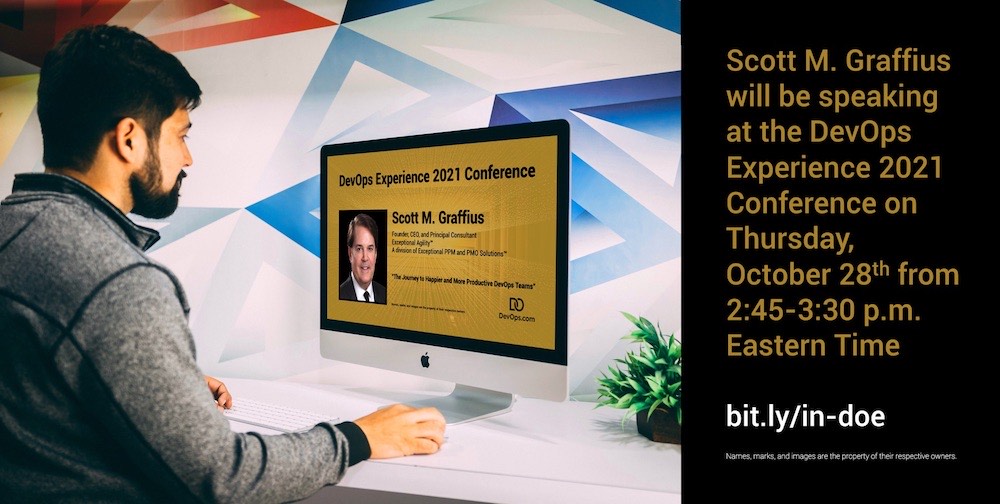

Update on October 28, 2021
If you missed the event, recordings of sessions are now available. Scott's talk is at https://player.vimeo.com/video/637145697 and the video is also shown below.

The short link for this blog post is: https://bit.ly/doe-21
The short link for a related post on LinkedIn is: https://bit.ly/in-doe
© Copyright 2021 Scott M. Graffius. All rights reserved. This material may not be published, broadcast, rewritten or redistributed without the express written permission of Scott M. Graffius.


🔥 Update: The DevOps Experience 2021 conference recorded sessions and made the videos available. The video for Scott's session is included at the end of this post.
Scott M. Graffius will be speaking at the DevOps Experience 2021 Conference. Now in its 4th year, the conference will explore the role DevOps will play in the "roaring 2020s". This year, speakers and attendees will interact virtually. Scott will present “The Journey to Happier and More Productive DevOps Teams.” His session will air at:
- Pacific Time: 11:45 a.m. to 12:30 p.m. on 28 October
- Eastern Time: 2:45 to 3:30 p.m. on 28 October
- Central European Time: 8:45 to 9:30 p.m. on 28 October
- Australian Eastern Time: 5:45 to 6:30 a.m. on 29 October

Attendees may be eligible to receivntinuing education unit (CEU) credit, equivalent to 0.75 Professional Development Hour (PDH). For reporting with the Project Management Institute (PMI), it's 0.75 Professional Development Unit (PDU), under the Leadership category. For reporting with the Scrum Alliance, it's 0.75 Scrum Educational Unit (SEU), under either the Learning category or the Events category. For reporting with other organizations, refer to their respective instructions.
To learn more and to secure tickets for the conference, visit https://www.techstrongevents.com/devopsexperience.

About Scott M. Graffius

Scott M. Graffius, PMP, CSP-SM, CSP-PO, CSM, CSPO, SFE, ITIL, LSSGB is an agile project management practitioner, consultant, award-winning author, and international speaker. He has generated over one billion dollars of business value in aggregate for the organizations he has served. Graffius is the founder, CEO, and principal consultant at Exceptional PPM and PMO Solutions™ and subsidiary Exceptional Agility™, based in Los Angeles, California. His expertise spans project, program, portfolio, and PMO leadership inclusive of agile, traditional, and hybrid approaches. Content from his books (Agile Scrum and Agile Transformation), workshops, speaking engagements, and more have been featured and used by businesses, governments, and universities including Gartner, Microsoft, Deloitte, Oracle, Cisco, Ford, Qantas, Atlassian, Bayer, the National Academy of Sciences, the United States Department of Energy, the United States Army, Project Management Institute, the IEEE, the New Zealand Ministry of Education, Tufts University, Texas A&M University, Virginia Tech, Penn State, Warsaw University of Technology, University of Waterloo, Loughborough University London, and others. Graffius has spoken at 58 conferences and other events around the world, including Armenia, Australia, Brazil, Canada, Czech Republic, Finland, France, Germany, Greece, India, Ireland, Lithuania, Luxembourg, Netherlands, New Zealand, Sweden, United Kingdom, and the United States. Thinkers360 named Graffius a global top thought leader and influencer in four domains: Agile, Change Management, Digital Transformation, and GovTech.
His full bio is available here.
Connect with Scott on:


About Agile Scrum: Your Quick Start Guide with Step-by-Step Instructions

Shifting customer needs are common in today's marketplace. Businesses must be adaptive and responsive to change while delivering an exceptional customer experience to be competitive.
There are a variety of frameworks supporting the development of products and services, and most approaches fall into one of two broad categories: traditional or agile. Traditional practices such as waterfall engage sequential development, while agile involves iterative and incremental deliverables. Organizations are increasingly embracing agile to manage projects, and best meet their business needs of rapid response to change, fast delivery speed, and more.
With clear and easy to follow step-by-step instructions, Scott M. Graffius's award-winning Agile Scrum: Your Quick Start Guide with Step-by-Step Instructions helps the reader:
- Implement and use the most popular agile framework―Scrum;
- Deliver products in short cycles with rapid adaptation to change, fast time-to-market, and continuous improvement; and
- Support innovation and drive competitive advantage.
Hailed by Literary Titan as “the book highlights the versatility of Scrum beautifully.”
Winner of 17 first place awards.
Agile Scrum: Your Quick Start Guide with Step-by-Step Instructions is available in paperback and ebook/Kindle in the United States and around the world. Some links by country follow.
- 🇧🇷 Brazil
- 🇨🇦 Canada
- 🇨🇿 Czech Republic
- 🇩🇰 Denmark
- 🇫🇮 Finland
- 🇫🇷 France
- 🇩🇪 Germany
- 🇬🇷 Greece
- 🇭🇺 Hungary
- 🇮🇳 India
- 🇮🇪 Ireland
- 🇮🇱 Israel
- 🇮🇹 Italy
- 🇯🇵 Japan
- 🇱🇺 Luxembourg
- 🇲🇽 Mexico
- 🇳🇱 Netherlands
- 🇳🇿 New Zealand
- 🇳🇴 Norway
- 🇪🇸 Spain
- 🇸🇪 Sweden
- 🇨🇭 Switzerland
- 🇦🇪 UAE
- 🇬🇧 United Kingdom
- 🇺🇸 United States

About Agile Transformation: A Brief Story of How an Entertainment Company Developed New Capabilities and Unlocked Business Agility to Thrive in an Era of Rapid Change

Thriving in today's marketplace frequently depends on making a transformation to become more agile. Those successful in the transition enjoy faster delivery speed and ROI, higher satisfaction, continuous improvement, and additional benefits.
Based on actual events, Agile Transformation: A Brief Story of How an Entertainment Company Developed New Capabilities and Unlocked Business Agility to Thrive in an Era of Rapid Change provides a quick (60-90 minute) read about a successful agile transformation at a multinational entertainment and media company, told from the author's perspective as an agile coach.
The award-winning book by Scott M. Graffius is available in paperback and ebook/Kindle in the United States and around the world. Some links by country follow.
- 🇦🇺 Australia
- 🇦🇹 Austria
- 🇧🇷 Brazil
- 🇨🇦 Canada
- 🇨🇿 Czech Republic
- 🇩🇰 Denmark
- 🇫🇮 Finland
- 🇫🇷 France
- 🇩🇪 Germany
- 🇬🇷 Greece
- 🇮🇳 India
- 🇮🇪 Ireland
- 🇯🇵 Japan
- 🇱🇺 Luxembourg
- 🇲🇽 Mexico
- 🇳🇱 Netherlands
- 🇳🇿 New Zealand
- 🇪🇸 Spain
- 🇸🇪 Sweden
- 🇨🇭 Switzerland
- 🇦🇪 United Arab Emirates
- 🇬🇧 United Kingdom
- 🇺🇸 United States

About the DevOps Experience Conference
The following includes content from the conference website:
As we stand poised to move beyond the COVID-19 pandemic, we are on the edge of what could be a giant leap forward. The world has come to see and recognize the power of digital transformation. Digital transformation is driven by software, and software is accelerated by DevOps. Cloud native computing has served as a catalyst to the DevOps, software, and digital transformation cycle. Now after perhaps 4-7 years worth of digital transformation progress compressed into the last 18 months concurrent with the pandemic, and with favorable capital markets and business outlook on the horizon, we are poised for a generational leap forward.
As we look forward to all of the great things this transformation enables, we also have to be ready to tackle tough problems like cybersecurity threats, future pandemics, and more. DevOps can be a powerful force for change in all of this. In its 4th year, this year's DevOps Experience will explore how DevOps will be a major factor in the "roaring 2020s."
To learn more about the DevOps Experience 2021 Conference, visit https://www.techstrongevents.com/devopsexperience.


Update on October 28, 2021
If you missed the event, recordings of sessions are now available. Scott's talk is at https://player.vimeo.com/video/637145697 and the video is also shown below.

The short link for this blog post is: https://bit.ly/doe-21
The short link for a related post on LinkedIn is: https://bit.ly/in-doe
© Copyright 2021 Scott M. Graffius. All rights reserved. This material may not be published, broadcast, rewritten or redistributed without the express written permission of Scott M. Graffius.

